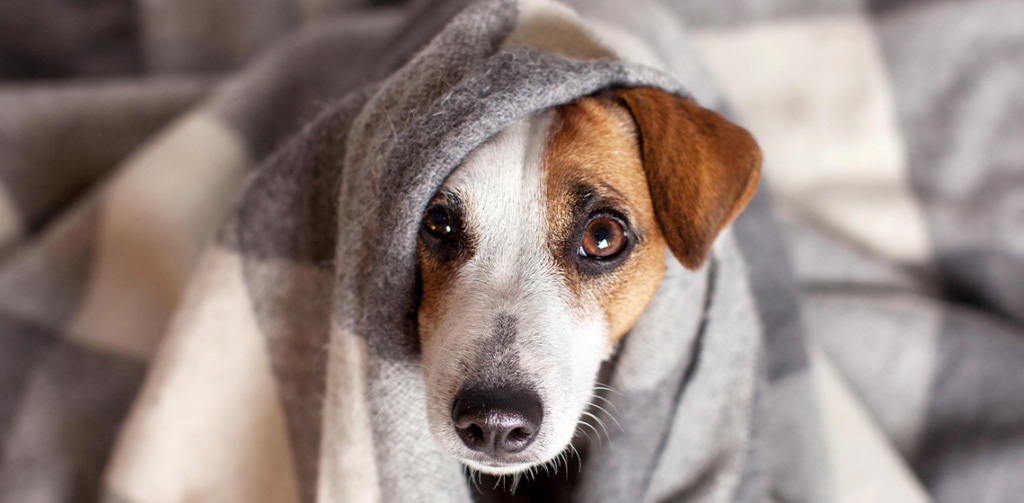It’s that time of year again! As well as being distressing for both pets and their parents, firework phobia can also result in self-harm and longer-term health issues. Not to mention destruction of your property. Let’s explore the proven ways you can calm your dog during fireworks.
Table of Contents
Is it normal for dogs to be scared of fireworks?
If your dog suddenly develops a fear of fireworks or only develops the fear later in life, then it is worth taking them for a veterinary check-up. Pain, senility, and changes to hearing can all contribute to a sudden fear of fireworks. This is a common misconception! While reacting to loud noises is a natural defense mechanism against potential harm, firework phobia is an extreme reaction and is not ‘normal’. Sadly, many dogs are lost during fireworks seasons as they try to run away from the fireworks. While it may seem like a seasonal problem, if left untreated it can actually cause prolonged behavioral issues.What are the symptoms of firework phobia in dogs?
The most common symptoms seen with firework phobias are shaking and trembling. Other possible symptoms include:- Hiding or cowering
- Holding the ears flattened
- Wide pupils
- Vocalizing
- Panting
- Drooling
- Broken teeth, cuts or ripped nails from scratching or trying to escape
- Defense aggression
- Passing feces or urine indoors
1. Preparation
Ahead of any fireworks, it’s important to make sure your dog is microchipped and that your details are up to date. Many dogs flee out of fear, and often just keep running. Secure your property’s boundaries as much as you can.2.Create a safe space
Several weeks before any anticipated fireworks, create a den for your dog. This can be a space under some furniture or an appropriately sized cardboard box with bedding inside. Draping towels over the box will help muffle the sound (leaving plenty of breathing spaces of course!). Such a ‘safe space’ in the home has been proven to be more effective when set up in advance, so the dog is already accustomed to space. You can encourage your dog to see this as a safe place by spraying pheromones, offering treats here, or leaving one of your worn t-shirts with their bedding. Never force your dog into space, all dogs are unique and what works for some may not help others.3. Exercise
Dogs with pent-up energy tend to be more reactive than those who have been well exercised. Exercise also releases endorphins, which are “happy” hormones. It’s important to make sure you exercise your dog and are home again well before any fireworks could start. In July this could mean a long walk early in the morning, to avoid the heat.4. Desensitization
Desensitization can be very effective, but only if carried out correctly. Put simply, desensitization means getting your dog accustomed to fireworks. However, if not carried out in a very controlled manner, this can actually worsen a phobia. Remember, dogs are scared of the noise, but also the flashing lights and sometimes the smell too. There are many YouTube videos available. Ideally, desensitization should be carried out under the supervision of your veterinarian or a veterinary behaviorist. The most important thing is to take it slowly and steadily, very gradually increasing the exposure. Use plenty of high-value treats during the exposure and stop if your dog shows any signs of fear. This is a long-term solution, not a quick fix. It works best if started from a very young age, but can still be effective in older dogs.5. Stay at home and stay calm!
Your presence is very likely to calm your dog. It’s OK to comfort them if it helps, or just be present. Don’t react to the fireworks yourself and keep the tone of your voice calm and soft, or you may unintentionally enhance their anxiety. Never punish or shout at your dog for any fear-related behavior, since this is guaranteed to make the situation worse!6. Prepare the environment
Block out as much sound and light as possible, by closing all the curtains and playing some low volume, calming music on the radio. Keep the lights on inside, so the flashes aren’t as obvious through the curtains.7. Provide distraction / counter conditioning
Counter conditioning means teaching your dog to replace a fear response with a pleasurable response. You can work on this at the same time as desensitization, using high-value treats whenever a firework goes off. During the fireworks, try offering your dog some tasty toys or games to play as a distraction, but it’s important never to force this.Don’t react to the fireworks yourself and keep the tone of your voice calm and soft, or you may unintentionally enhance their anxiety.
8. Nutraceuticals
There are many nutraceuticals on the market aimed at keeping dogs calm in stressful situations. Response to these can be variable, so it may take a few tries to find something that works for your dog. However, most of them are very safe and so are definitely worth trying. Pheromone sprays and plug-ins, or supplements containing ingredients like L tryptophan can have a calming effect. Special doggy shirts are also available, which apply gentle pressure and act in a manner similar to swaddling a baby.9. Medication
In some cases medication is an essential part of the treatment plan. While sedatives are no longer recommended, anxiety reducing drugs can greatly improve the symptoms and quality of life in dogs with firework phobias. It’s a good idea to speak with your veterinarian about treatment options well in advance. Although medication is a quick and easy fix, it can only be used in the short term. It also does not address any long-term issues, and so should be used alongside the other techniques described.It is important that you never give your dog any drug without speaking with your veterinarian first since this can be very dangerous.
10. Don’t self-medicate!
Google can suggest all sorts of home remedies, from Benadryl to Xanax. It is important that you never give your dog any drug without speaking with your veterinarian first since this can be very dangerous. Although there are quick fixes available, the best solution is to use these alongside long-term measures to reduce fear. Some studies have shown around a 60% reduction of fear behavior after only 60 days of a program combining desensitization, counter-conditioning, and pheromones. So, don’t let your dog suffer year after year, speak with your veterinarian today about long-term solutions!FAQ
You can buy over the counter supplements containing ingredients such as L-tryptophan, which can have a calming effect. Dog Appeasing Pheromone in sprays or plug-ins can often help too. If you think your dog needs something stronger, speak with your veterinarian about anxiety reducing medication.
A safe space where the sound and light are blocked out, alongside reassurance from their pet parents is a great start. Nutraceuticals, compression shirts and medication are all helpful options. Longer term, desensitization and counter conditioning are effective.
Fear of unknown, unpredictable loud noises and flashes is an evolutionary defense mechanism, designed to protect the animal from harm. They trigger the ‘flight or fight’ response. After all, dogs don’t know it’s the 4th of July, or what fireworks are! Because they happen infrequently, dogs do not have time to acclimatize to them.
It is no longer recommended to sedate a dog for fireworks. Sedatives do not reduce fear, they simply prevent the dog from showing their fear. Non-sedating anxiety reducing medications called anxiolytics are now used, with good effect. Your veterinarian will be able to advise you on suitable options for your dog.

Sarah-Jane Molier wanted to be a veterinarian from around the age of ten. After much hard work, and her first degree in animal science, she realized this dream and graduated in 2009. She has been working in small animal clinics ever since.








